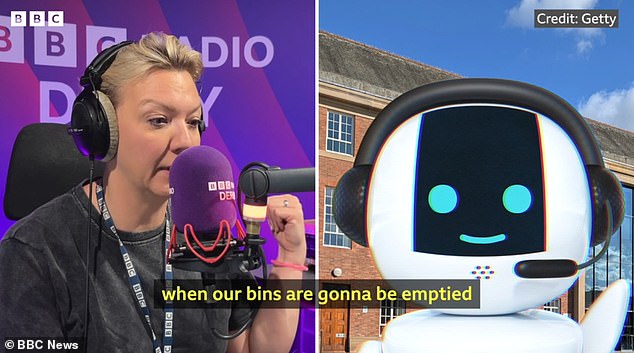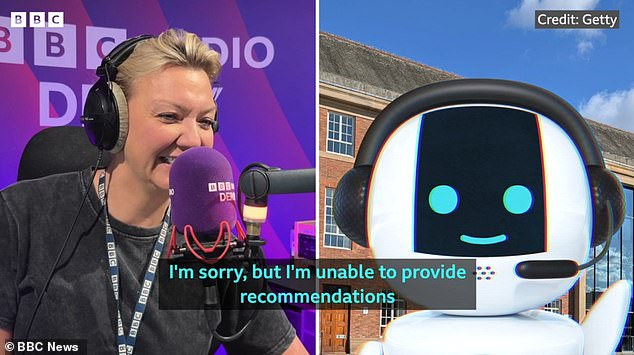It is designed to allow residents to access information at any time of the day or night, without waiting in a long phone queue.
But people living in Derby have been left bewildered after the council’s new digital AI assistant struggled to understand their local dialect.
Common words used in the county such as ‘mardy’ and ‘duck’ prompted an automated response asking for users to repeat the question.
The Labour-run council acknowledged its digital AI assistant called Darcie has room to improve.
Introduced in 2023 to answer phones and website queries, Darcie is the the public’s first contact if they need help when calling Derby City Council or visiting its website.
Following an upgrade the council said Darcie can now understand more complex questions and hold more natural conversations, ‘offering a smoother and more human-like experience when answering queries’.

BBC Radio Derby reporter Becky Measures was misunderstood by Darcie on a number of occasions when she called to test it live on air

The council said its two AI assistants have handled over 2 million enquiries since they were launched in 2023 resolving 44% of cases without the need for staff input
It said it continues to improve over time and will learn every time the digital helper is asked a question.
Both web and phone versions of Darcie have been upgraded to support nine of the most widely spoken languages in Derby, after English based on Council data – Arabic, Czech, Pashto, Polish, Punjabi, Romanian, Slovak, Somali, and Urdu.
But regional words appear to have been missed.
BBC Radio Derby reporter Becky Measures, who has a strong Derbyshire accent, was misunderstood by Darcie on a number of occasions when she called to test it live on air.
The Local Democracy Reporting Service (LDRS) also asked Darcie online: ‘How do I pay council tax duck?’ But Darcie responded: ‘the message was blocked by our content filter’ and asked for the question to be rephrased.
At a council cabinet meeting on Wednesday, city councillor Hardyal Dhindsa alluded to phrases that Darcie was struggling to pick up such as ‘mardy’ (moaning) and ‘duck’ (dear/love).
Mr Dhindsa said the council was continuing efforts to ‘teach Darcie to understand Derby phrases to further enhance its local understanding’.
The council said it had made improvements to Darcie so it could answer more complicated questions.
The upgraded version of Darcie has ‘demonstrated its effectiveness by successfully answering 58% of calls,’ said Mr Dhindsa.
During the council meeting Mr Dhindsa said Darcie was becoming ‘much more human’ and would improve further so it could respond better to people’s enquiries and their turns of phrase.
‘It still can be improved,’ said Mr Dhindsa.
‘As the Radio Derby reporter said, it didn’t understand Derbyshire dialect so well. Well, it will learn to do that. Our expert IT people will work on doing that.
‘It’s learning every time it has an experience and is much more human.
‘The council remains committed to providing comprehensive support, continuing to offer all other channels such as face-to-face interactions, human telephone support, and other accessible channels if Darcie cannot help or if the situation is inappropriate for digital assistance.’

At a council cabinet meeting on Wednesday, city councillor Hardyal Dhindsa alluded to phrases that Darcie was struggling to pick up such as ‘mardy’ and ‘duck’
Leader of the city council, Councillor Nadine Peatfield, said she was impressed it could learn the local dialect.
‘I love that. So instead of it trying to translate something about ducks, it is actually recognising it’s a turn of phrase. Brilliant. The Derby way.’
The council has already saved £200,000 by losing four full-time equivalent agency jobs due to artificial intelligence (AI).
Derby City Council said agency workers in the customer management department were being reduced.
It aims to nearly £4m of savings through AI in 2024-25. But opposition councillors have raised concerns about more possible future job losses due to AI.
Available 24/7 via phone and the Council website, the council says Darcie ensures that residents can access information and support at any time, including evenings, weekends, and public holidays and without having to wait in a call queue.
Residents can still choose to speak to a human advisor during normal office hours for more complex needs.
It was introduced alongside another AI assistant called Ali, who manages housing enquiries for Derby Homes.
The council said the two AI assistants have handled over 2 million enquiries since launch, resolving 44% of cases without the need for staff input, allowing frontline teams to focus on customers who need more than a simple response.
Since the upgrade was launched on 20 May, the Council has seen an 84% reduction in calls to the switchboard during peak times, with 57% of customer queries now being responded to directly by Darcie and the remainder are dealt with by a human advisor).
But resident Dave Jowitt said: ‘The system is useless, had to phone in to sort something out about council tax and it took 5 minutes to actually talk to a real person the AI just kept going round in circles.’
Last year, the council was criticised for spending £30,000 on two robotic vacuum cleaners.
Opposition councillors say they feared the move by Labour-run Derby City Council was the ‘next step towards phasing out physical staff for automation’ as it tries to claw back a predicted £9.6 million overspend.
The council has said the robotic cleaners will ‘increase the capacity of existing cleaning staff and extend the lifespan of the carpet’ at its Council House headquarters in the city.
It has spent £33,000 on the two machines, which includes a three-year servicing agreement. The council insisted they would not lead to job losses.